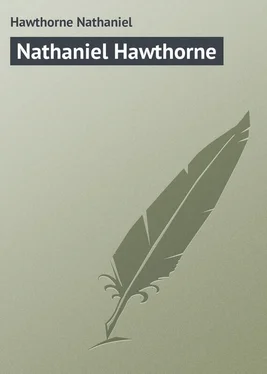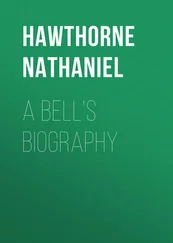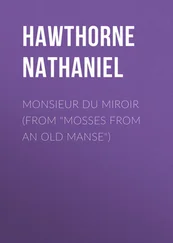Nathaniel Hawthorne - Nathaniel Hawthorne
Здесь есть возможность читать онлайн «Nathaniel Hawthorne - Nathaniel Hawthorne» — ознакомительный отрывок электронной книги совершенно бесплатно, а после прочтения отрывка купить полную версию. В некоторых случаях можно слушать аудио, скачать через торрент в формате fb2 и присутствует краткое содержание. Жанр: foreign_prose, на английском языке. Описание произведения, (предисловие) а так же отзывы посетителей доступны на портале библиотеки ЛибКат.
- Название:Nathaniel Hawthorne
- Автор:
- Жанр:
- Год:неизвестен
- ISBN:нет данных
- Рейтинг книги:3 / 5. Голосов: 1
-
Избранное:Добавить в избранное
- Отзывы:
-
Ваша оценка:
- 60
- 1
- 2
- 3
- 4
- 5
Nathaniel Hawthorne: краткое содержание, описание и аннотация
Предлагаем к чтению аннотацию, описание, краткое содержание или предисловие (зависит от того, что написал сам автор книги «Nathaniel Hawthorne»). Если вы не нашли необходимую информацию о книге — напишите в комментариях, мы постараемся отыскать её.
Nathaniel Hawthorne — читать онлайн ознакомительный отрывок
Ниже представлен текст книги, разбитый по страницам. Система сохранения места последней прочитанной страницы, позволяет с удобством читать онлайн бесплатно книгу «Nathaniel Hawthorne», без необходимости каждый раз заново искать на чём Вы остановились. Поставьте закладку, и сможете в любой момент перейти на страницу, на которой закончили чтение.
Интервал:
Закладка:
"My dear widow, you are charming!" cried Colonel Killigrew, whose eyes had been fixed upon her face, while the shadows of age were flitting from it like darkness from the crimson daybreak.
The fair widow knew, of old, that Colonel Killigrew's compliments were not always measured by sober truth; so she started up and ran to the mirror, still dreading that the ugly visage of an old woman would meet her gaze. Meanwhile, the three gentlemen behaved in such a manner, as proved that the water of the Fountain of Youth possessed some intoxicating qualities; unless, indeed, their exhilaration of spirits were merely a lightsome dizziness, caused by the sudden removal of the weight of years. Mr. Gascoigne's mind seemed to run on political topics, but whether relating to the past, present, or future, could not easily be determined, since the same ideas and phrases have been in vogue these fifty years. Now he rattled forth full-throated sentences about patriotism, national glory, and the people's right; now he muttered some perilous stuff or other, in a sly and doubtful whisper, so cautiously that even his own conscience could scarcely catch the secret; and now, again, he spoke in measured accents, and a deeply deferential tone, as if a royal ear were listening to his well-turned periods. Colonel Killigrew all this time had been trolling forth a jolly bottle-song, and ringing his glass in symphony with the chorus, while his eyes wandered toward the buxom figure of the Widow Wycherly. On the other side of the table, Mr. Medbourne was involved in a calculation of dollars and cents, with which was strangely intermingled a project for supplying the East Indies with ice, by harnessing a team of whales to the polar icebergs.
As for the Widow Wycherly, she stood before the mirror courtesying and simpering to her own image, and greeting it as the friend whom she loved better than all the world beside. She thrust her face close to the glass, to see whether some long-remembered wrinkle or crow's-foot had indeed vanished. She examined whether the snow had so entirely melted from her hair, that the venerable cap could be safely thrown aside. At last, turning briskly away, she came with a sort of dancing step to the table.
"My dear old doctor," cried she, "pray favor me with another glass!"
"Certainly, my dear madam, certainly!" replied the complaisant doctor; "see! I have already filled the glasses."
There, in fact, stood the four glasses, brimful of this wonderful water, the delicate spray of which, as it effervesced from the surface, resembled the tremulous glitter of diamonds. It was now so nearly sunset, that the chamber had grown duskier than ever; but a mild and moonlike splendor gleamed from within the vase, and rested alike on the four guests, and on the doctor's venerable figure. He sat in a high-backed, elaborately carved oaken arm-chair, with a gray dignity of aspect that might have well befitted that very Father Time, whose power had never been disputed, save by this fortunate company. Even while quaffing the third draught of the Fountain of Youth, they were almost awed by the expression of his mysterious visage.
But, the next moment, the exhilarating gush of young life shot through their veins. They were now in the happy prime of youth. Age, with its miserable train of cares, and sorrows, and diseases, was remembered only as the trouble of a dream, from which they had joyously awoke. The fresh gloss of the soul, so early lost, and without which the world's successive scenes had been but a gallery of faded pictures, again threw its enchantment over all their prospects. They felt like new-created beings, in a new-created universe.
"We are young! We are young!" they cried exultingly.
Youth, like the extremity of age, had effaced the strongly marked characteristics of middle life, and mutually assimilated them all. They were a group of merry youngsters, almost maddened with the exuberant frolicsomeness of their years. The most singular effect of their gayety was an impulse to mock the infirmity and decrepitude of which they had so lately been the victims. They laughed loudly at their old-fashioned attire, the wide-skirted coats and flapped waistcoats of the young men, and the ancient cap and gown of the blooming girl. One limped across the floor, like a gouty grandfather; one set a pair of spectacles astride of his nose, and pretended to pore over the black-letter pages of the book of magic; a third seated himself in an arm-chair, and strove to imitate the venerable dignity of Dr. Heidegger. Then all shouted mirthfully, and leaped about the room. The Widow Wycherly – if so fresh a damsel could be called a widow – tripped up to the doctor's chair, with a mischievous merriment in her rosy face.
"Doctor, you dear old soul," cried she, "get up and dance with me!" And then the four young people laughed louder than ever, to think what a queer figure the poor old doctor would cut.
"Pray excuse me," answered the doctor, quietly. "I am old and rheumatic, and my dancing days were over long ago. But either of these gay young gentlemen will be glad of so pretty a partner."
"Dance with me, Clara!" cried Colonel Killigrew.
"No, no, I will be her partner!" shouted Mr. Gascoigne.
"She promised me her hand, fifty years ago!" exclaimed Mr. Medbourne.
They all gathered round her. One caught both her hands in his passionate grasp, – another threw his arm about her waist, – the third buried his hand among the glossy curls that clustered beneath the widow's cap. Blushing, panting, struggling, chiding, laughing, her warm breath fanning each of their faces by turns, she strove to disengage herself, yet still remained in their triple embrace. Never was there a livelier picture of youthful rivalship, with bewitching beauty for the prize. Yet, by a strange deception, owing to the duskiness of the chamber, and the antique dresses which they still wore, the tall mirror is said to have reflected the figures of the three old, gray, withered grandsires, ridiculously contending for the skinny ugliness of a shrivelled grandam.
But they were young: their burning passions proved them so. Inflamed to madness by the coquetry of the girl-widow, who neither granted nor quite withheld her favors, the three rivals began to interchange threatening glances. Still keeping hold of the fair prize, they grappled fiercely at one another's throats. As they struggled to and fro, the table was overturned, and the vase dashed into a thousand fragments. The precious Water of Youth flowed in a bright stream across the floor, moistening the wings of a butterfly, which, grown old in the decline of summer, had alighted there to die. The insect fluttered lightly through the chamber, and settled on the snowy head of Dr. Heidegger.
"Come, come, gentlemen! – come, Madam Wycherly," exclaimed the doctor, "I really must protest against this riot."
They stood still and shivered; for it seemed as if gray Time were calling them back from their sunny youth, far down into the chill and darksome vale of years. They looked at old Dr. Heidegger, who sat in his carved arm-chair, holding the rose of half a century, which he had rescued from among the fragments of the shattered vase. At the motion of his hand, the four rioters resumed their seats; the more readily, because their violent exertions had wearied them, youthful though they were.
"My poor Sylvia's rose!" ejaculated Dr. Heidegger, holding it in the light of the sunset clouds; "it appears to be fading again."
And so it was. Even while the party were looking at it, the flower continued to shrivel up, till it became as dry and fragile as when the doctor had first thrown it into the vase. He shook off the few drops of moisture which clung to its petals.
"I love it as well thus, as in its dewy freshness," observed he, pressing the withered rose to his withered lips. While he spoke, the butterfly fluttered down from the doctor's snowy head, and fell upon the floor.
Читать дальшеИнтервал:
Закладка:
Похожие книги на «Nathaniel Hawthorne»
Представляем Вашему вниманию похожие книги на «Nathaniel Hawthorne» списком для выбора. Мы отобрали схожую по названию и смыслу литературу в надежде предоставить читателям больше вариантов отыскать новые, интересные, ещё непрочитанные произведения.
Обсуждение, отзывы о книге «Nathaniel Hawthorne» и просто собственные мнения читателей. Оставьте ваши комментарии, напишите, что Вы думаете о произведении, его смысле или главных героях. Укажите что конкретно понравилось, а что нет, и почему Вы так считаете.












